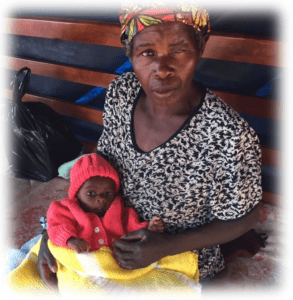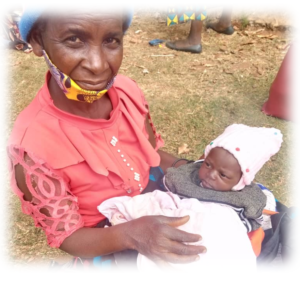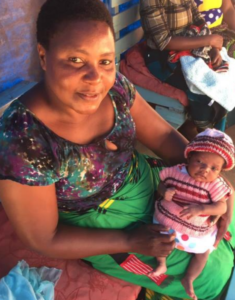
In the month of October…
- 11 babies were enrolled including 8 orphans, 2 babies of moms with no breast milk and 1 baby whose mom was experiencing psychosis.
- 2 critically ill women were enrolled after difficult deliveries
- 203 babies and postpartum mothers received home visits by nurses
- 626 tins of formula were provided to infants without access to breast milk.
- nurses are following a total of 242 babies & moms
Baby Admission Story.
Benita had a cough. It wasn’t new. For years she would feel the need to cough to clear her throat. Sometimes it was worse and would wake her in the night or steal her breath when she laughed too hard. Other times it was just an annoyance a small tickle in the mornings that would not resolve. Her mother encouraged her to go to the hospital but Benita insisted, I am not sick, it is just a cough. What would they do at the hospital anyway? Maybe that would give her a medicine or maybe they would just tell her to drink warm liquids. She could certainly live with it and life in the village was too busy to spend a day walking to the waiting at the hospital for something as banal as a cough. Benita had three children and was pregnant with her fourth. She attended prenatal care regularly but even there no one though much of her cough. On July 12, 2020 she delivered a healthy baby girl and returned home on the 13th. In September her cough worsened and on September 29th she died. Her mother did not have the resources to care for a newborn, where would she find milk? how could she purchase formula? By circumstance she met a woman who lived in a neighboring village who was caring for an orphan and enrolled in our program and the grandmother found her way to us.
[No one will ever know what caused Benita’s death. There are no autopsies for the poor. In fact even the death itself might not have been registered. It is possible that Benita had asthma and then died of covid.] Donate
Mother Admission Story.
When Rhoda showed up to the prenatal clinic at a rural clinic with a small bump of a belly, the midwives told her that she would need to deliver at the District Maternity Hospital. She was only sixteen and they foresaw a difficult birth. It would be risky to attempt to deliver her in a facility that had minimal capacity to offer emergency obstetric care and no capacity to conduct a cesarean section. They reminded her each visit and when her labor started on October 23rd, she made her way to Bwaila (the District Hospital). The labor was indeed hard. With no pain medication, Rhoda suffered the onslaught of her contractions without progress. Finally in the afternoon of the follow day she delivered a baby boy by cesarean. Her son had experienced a great deal of stress during the labor and his condition was poor. Rather than stay with his mother he was sent to the nursery. On the 25th Rhoda’s abdomen was painfully distended and nurses observed green discharge oozing from the wound. She and her baby were transferred to the Regional Hospital for better care. On the 26th clinicians reopened the wound and her abdomen was irrigated. She did not improve. Nor did her son. On November 4th she had a total hysterectomy – uterus, ovaries gone. On the same day, her baby died. She was discharged home on November 11th.
Statistically, Rhoda is a success. She is not counted among the many African women who die in childbirth. But when we move from the macro-statistics and focus on Rhoda; when we hear her story, we can only count it as a tragedy. There are so many more women like Rhoda on the continent who struggle to go on after traumatic births, which leave them both physically and emotionally wounded. Join us to support the re-empowerment of Rhoda and women like her and to bring attention to their lives. Donate now




